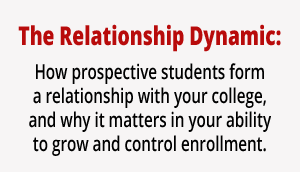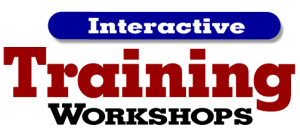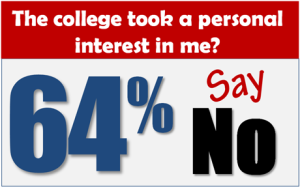We recently announced the launch of our new co-sponsored study, “The Relationship Dynamic: How prospective students form a relationship with your college, and why it matters in your ability to grow and control enrollment.”
This study is a partnership of private and public colleges and universities from across the country seeking powerful data about building the types of relationships with prospective students that will lead to enrollment. This is the seventh co-sponsored study we have facilitated in the past six years in an effort to help enrollment management professionals dive deeply into the heart of the issues impacting our industry. CLICK HERE to learn more about getting involved in this new study.
 Our most recent studies have uncovered many enlightening, surprising, and sometimes, even shocking, insights about the college shopping process. Adept admissions professionals consider these findings opportunities to differentiate their own college in the minds of the students they are recruiting. Here are just a few examples:
Our most recent studies have uncovered many enlightening, surprising, and sometimes, even shocking, insights about the college shopping process. Adept admissions professionals consider these findings opportunities to differentiate their own college in the minds of the students they are recruiting. Here are just a few examples:
Enlightening….
A student’s first choice school is very likely to change.
Roughly 40% of students from the pools of public and private colleges swap out their former first choice school with another institution during their college selection process. This happens in about 25% of cases for prospective community college students.
Surprising….
Your college’s perception can be changed from “too expensive” to “totally worth it!”
Even though a student or parent may initially view a college as being “too expensive,” 70% would be likely (25% very likely) to reconsider the college if it can demonstrate greater value. When asked to identify the added value that would be required, numerous students and parents mentioned a scholarship or other financial incentive. However, the majority mentioned added values that are non-monetary such as “greater opportunities,” “job placement,” “better internships”, and “superior academics.”
Shocking….
Prospective students and their parents rank college pre-enrollment service lower than the post office, Walmart and their cell phone providers.
Nationally, students and parents gave colleges and universities a rating of 6.83 in overall service during the college selection process. Compare that to the American Customer Satisfaction Index that reports the United States Postal Service receives an average rating of 7.4, banks earn a rating of 7.6, hospitals 7.7, wireless telephone providers 7.1, and discount stores 7.6. Need I say more?
More Shocking….
That prospective student you are working so hard to recruit? He or she thinks you don’t really care.
In our most recent nationally co-sponsored study, “The Excitement Factor!”,we asked 12,000 college-bound students if the colleges they were considering had taken a personal interest in them at any point in the recruiting process. The response was shocking. Two-thirds said “No” or “Don’t Remember” and in our view “Don’t remember” is the same as “No.” (You can DOWNLOAD the full report now.)
“The Excitement Factor!” revealed that a student’s college selection is tied closely to the strength of the relationship they build with a college over time. Contributing to the overall relationship are interactions a prospective student has with current students, professors, admission counselors, and even people in points across campus and beyond that are unknown to the admission office. Additionally, students revealed that they can, and do, form strong connections with colleges that lead to enrollment without ever stepping foot on campus.
Building relationships is a complex, nuanced and powerful part of student recruitment. Colleges are asking what they can do to influence relationship-building with their prospective students in all aspects of their recruitment efforts, from social media to personal contact. And, they want to know how to involve all influencers, on or off campus, in the development of rich relationships with prospective students.
Join this partnership of highly-respected colleges and universities and here’s what you’ll learn about the prospective students in your pool:
- When the relationship building process begins, the subsequent timeline, and milestones
- Why students form a bond with one college and not another
- The types of conversations and interactions that bind a student to a college
- How admission counselors and others on campus can be more effective as relationship builders
- How differing forms of communication help to cultivate relationships (personal interaction, email, social media, direct mail, and more)
- Identifying psychographic segments of students and the types of relationships they seek with colleges
- How people and methods outside the control of the college impact relationship building and how you can leverage those influences
Co-sponsors find our studies valuable because of the wealth of information they gain – information they can use to drive action and change. And because these studies attract a high number of co-sponsoring institutions they are extremely affordable, costing a fraction of the expense of an individual research project.
For more information, download detailed information about the study by CLICKING HERE or call us at 913/492.1265 x.701.
Continue the conversation on Twitter @LongmireCo. Be sure to Subscribe to Versions of Conversion today so you don’t miss any of this highly-valuable information.
 Rick Montgomery is as an Enrollment Strategist at Longmire and Company. With over 20 years in higher education marketing, he brings an innovative approach to helping colleges and universities meet their enrollment goals. Rick can be reached at 913/492.1265 x.708 or via email at rmontgomery@longmire-co.com.
Rick Montgomery is as an Enrollment Strategist at Longmire and Company. With over 20 years in higher education marketing, he brings an innovative approach to helping colleges and universities meet their enrollment goals. Rick can be reached at 913/492.1265 x.708 or via email at rmontgomery@longmire-co.com.
 Pick any attribute and benefit that you communicate about your college and in all likelihood there are many other colleges that are saying exactly the same thing. Falling into this trap is essentially the same as stepping up to the plate and calling two strikes on yourself before the first pitch. You can’t differentiate your college in the hearts and minds of prospective students.
Pick any attribute and benefit that you communicate about your college and in all likelihood there are many other colleges that are saying exactly the same thing. Falling into this trap is essentially the same as stepping up to the plate and calling two strikes on yourself before the first pitch. You can’t differentiate your college in the hearts and minds of prospective students.

 For college admissions counselors and enrollment managers facing this challenge, we have some good news and important insights gleaned from our latest co-sponsored study, The Excitement Factor! Of the 12,000 students participating in the study, 20% committed to the college of their choice after the first of May.
For college admissions counselors and enrollment managers facing this challenge, we have some good news and important insights gleaned from our latest co-sponsored study, The Excitement Factor! Of the 12,000 students participating in the study, 20% committed to the college of their choice after the first of May.




